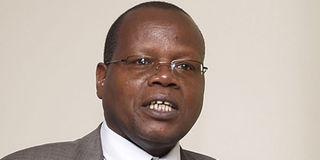Medical students sexually harassed, says report

Public Health and Sanitation permanent secretary Mark Bor during the launch of a report on Performance Needs Assessment of Kenya Health Training System at Panafric Hotel November 16, 2011. Tutors in medical training colleges are demanding sex in exchange for favourable examination marks, the study shows. BILLY MUTAI
Tutors in medical training colleges are demanding sex in exchange for favourable examination marks, a study shows.
A report on the Performance Needs Assessment of the Kenya Health Training System 2011 said some students reported harassment by male lecturers especially during exam time.
“There are sex engineered grades whereby a male lecturer will require a student to perform sexual favours before being awarded certain grades. Participants reported that some instructors requested female students to give in before they are assisted in their work and if the student did not comply, she should be given a failing grade,” the report released Wednesday says.
Launched by Public Health and Sanitation permanent secretary Mark Bor at Panafric Hotel in Nairobi, the study by Capacity Kenya NGO said female students who reported being harassed by male tutors believed there was no avenue for recourse.
"Male participants reported being involved in love triangles and being bullied or harassed by male lecturers who were interested in the same female students."
The report called for development of policies and programs to protect students from sexual harassment, enforcing existing codes of conduct including sacking of tutors who harass students and creation of “safe space” for students to anonymously report the vice without fear or reprisal.
The report further called for an end to discrimination of students based on pregnancy. The students regretted that their female colleagues had been forced to terminate their studies due to pregnancies.
The report proposed that through policy development, pregnant students and those with family responsibilities should be allowed to continue with their education and work without discrimination.
“Colleges should end punitive policies or practices that target pregnant students and introduce alternatives to reduce drop out rates,” the report said.
The report called for harmonisation of curriculum across institutions offering medical courses and that regulatory bodies should be completely delinked from training institutions.
It also called for better remuneration of medical workers and curriculum review to be at par with technological changes.
The report was sponsored by United States Agency for International Development (USAID).
Mr Bor said the recommendations made by the study provide an opportunity for the ministries of Health to harness resources and “support interventions to deliver the Kenya Essential Package for Health and improve the health training system.”
Mr Bor said his Ministry and that of Medical Services were ready to provide leadership and support needed to sustain effort towards positive environment for training the health workforce.
The PS said Capacity Kenya was currently supporting the Ministries of Health to map out the entire health workforce in the country.
He said the East African Community was also mapping entire health workforce in the region in an exercise that is being coordinated by the Ministry of Labour.
Mr Bor was accompanied by Capacity Kenya project director Meshack Ndolo and Dr Anastasiah Kimeu, Peter Waithaka from USAID, Ms Grace Odwako from Ministry of Medical Services and David Njoroge from Ministry of Public Health.
Mr Waithaka said medical personnel should be well distributed in parts of the country, ensure quality and be well motivated through better salaries, good working environment, housing and professional development.




